PZ.131 Edgar
3 May 2020PZ.528 Boy Fred
4 May 2020Renovelle ~PZ.107. Ex-Edgar ~ PZ.131; & PH.202.
In the summer of 1931, after less than two years on the Plymouth register, the Edgar – having been purchased by Edwin Madron, of Vivian Terrace, Mousehole – was brought back to Mount’s Bay. Re-registered at Penzance on, September 21st, 1931, she was now re-named Renovelle, and allocated the fishing number PZ.107 – this old number having become free for re-allocation when the Our Pride ~ PZ.107 was transferred to St. Ives in August 1919. After a suitable time lapse, free numbers were frequently re-allocated.
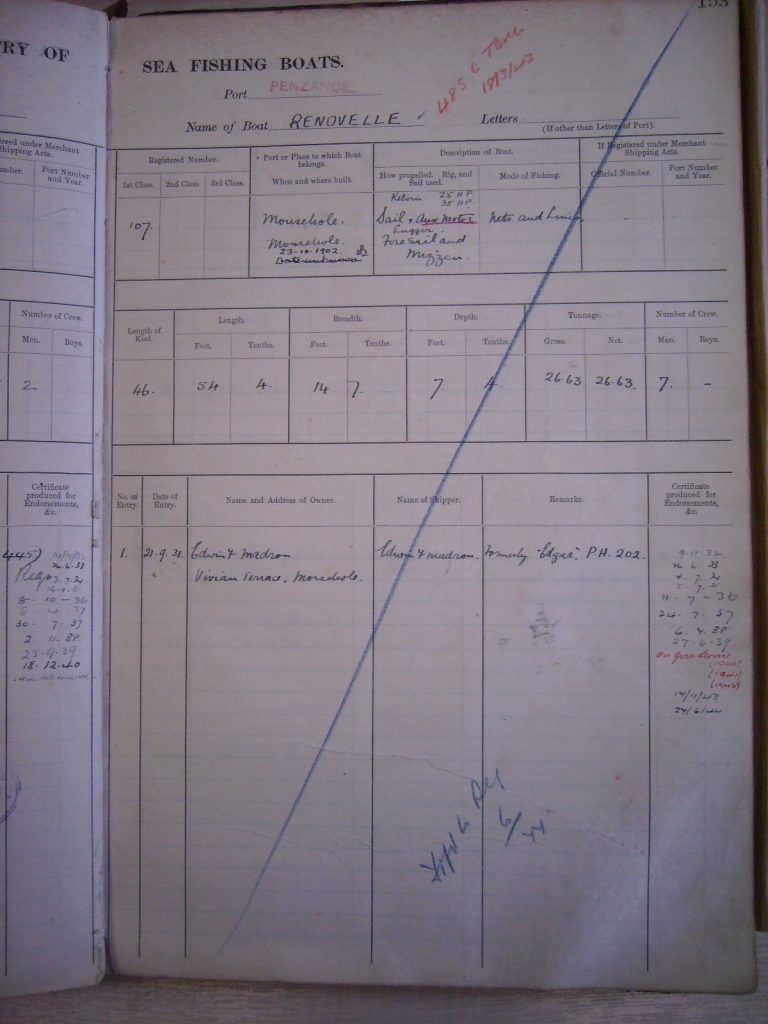
A fully powered motor fishing boat, she re-joined the small fleet of Mousehole long-liners, working out of that port during the inter-war years. She was now powered by two Kelvins, one of 35 hp., and the other of 25 hp. The main engine driving a centre-line shaft and prop, and the auxiliary driving an off-set shaft on the port quarter.
While principally a long-liner, she also worked mackerel and herring drift nets in season, and that winter she was fishing for herring out of Plymouth. One of a large number of local and visiting craft so engaged.
HERRING FISHERY – IMPROVED LANDINGS AT BARBICAN, PLYMOUTH.
The prospects for herring fishing at Plymouth are much brighter, and, undoubtedly, had not the majority of the smaller boats been confined to harbour owing to rough weather on Monday night a much larger quantity would have been landed at Plymouth yesterday. As it was, 50 crans were contributed to the total of 560 crans by 20 of the motor drifters.
The demand and prices were good. Values averaged from 54s. to 60s. per cran, and the highest catches for steam drifters, fishing in deep water, were secured by the Peaceful Star, 65 crans; the Buckler, 50 crans; the True Reward, 45 crans, the Fisher Girl, 35 crans; and the Girl Margaret and the Oakland, 30 crans each. All the boats came from Lowestoft, except the Oakland, which came from Yarmouth.
The highest catch for the motor drifters were obtained by the Renovelle, 10 crans; the Lyonesse, six crans (both from Penzance); and the Our John, St. Ives, six crans.
Western Morning News. Wednesday, December 30th, 1931
In the December of 1932 she was made the headlines as a Sunday breaker at St. Ives.
BAN ON SUNDAY FISHING – MOUSEHOLE BOAT IN ST. IVES INCIDENT – COULD NOT LAND CATCH MADE ON THURSDAY – “BOYCOT” FOR LAST WINTER’S “OFFENCE.”
DISCUSSION has arisen in fishing circles in West Cornwall over the circumstances which led to the Mousehole fishing boat Renovelle putting to sea from St. Ives in heavy weather on Thursday last without having landed her catch.
Since the riots of many years ago feeling in St. Ives has been strongly against Sunday fishing, and the rule has been rigidly adhered to, it being many years since the last incident occurred in connection with this controversial subject.
St. Ives fishermen refuse to allow their own men to sell fish in port which has been caught by Sunday labour.
Any man who has fished from any port at any time on a Sunday is debarred thereafter from selling his fish at St. Ives, being only allowed to use the port for shelter.
It was this that led to last Thursday’s incident.
The fishing boat concerned is owned by Mr. E. Maddern [Madron], of Mousehole. He seldom fishes in St. Ives Bay, but on Thursday last had a small catch which he wished to dispose of there.
It appears that during the last winter he fished out of Plymouth on Sundays, and though he has done no Sunday fishing since he was warned that if he attempted to sell his fish in St. Ives there might be some unpleasantness.
SALESMAN GIVEN HINT – SUNDAY EMBARGO “STRICTLY ADHERED TO”
A fish salesman was also advised not to deal with his catch, and strongly advised by his Father-in-law, who is a St. Ives fisherman. Mr. Maddern left the port in the teeth of heavy weather and made a rough trip around the Land’s End to his home port of Mousehole.
Mr. Maddern, in an interview with “The Western Morning News” yesterday, said he had a wife and children to support. Apparently because he had fished on a Sunday, even at Plymouth last winter, he was not allowed to use the market at St. Ives.
While at sea on Wednesday night a St. Ives boat hailed him and said that he would not be allowed to sell his fish in St. Ives the following morning. He proceeded to the port, however, but when he got there his father-in-law came aboard and told him that there might be trouble if he landed, and it was for the sake of his relatives in the town rather than from any personal fear of the consequences, that he took the advice and left the port.
He had only about 300 fish on board, and this was not enough to risk a row about. If he had had a big catch he would have landed.
Western Morning News, Tuesday, December 6th, 1932
The whole matter was reviewed a couple of days later, when it was further reported:
That Mr. Madron is a native of Mousehole, and was very hard-working. He married a St. Ives woman, whose relatives fish out of that port. Naturally they did not interfere with Mr. Madron; indeed, the objection to the Renovelle’s intended sale is said to have been limited to a few fishermen.
The Renovelle is one of the largest and best-fitted motor boats in Mount’s Bay. Formerly known as the Edgar at Mousehole, she was sold to Plymouth, where Mr. Madron bought her back, refitted her at a cost of hundreds of pounds, and is now trying to make good the expenditure as well as earn a living for himself and family of four small children.
Western Morning News. Thursday, December 8th, 1932
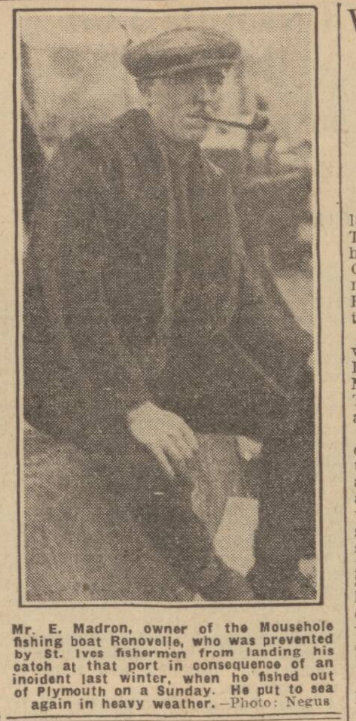
It was all a bit of a storm on a tea-cup, and quickly blew over. During the second week in December there were big hauls of herring off Plymouth, and the Renovelle topped the list.
OVER 40 DRIFTERS – WESTCOUNTRY BOATS RETURN WITH HIGHEST HAULS.
East Coast drifters are arriving every day, and the six which reached Plymouth yesterday brought their number up to over 40.
On Tuesday night the coasters operated off Stoke Point, while the local boats worked the shallower water off Bigbury Bay. Catches ran between five and 20 crans per boat, but two Westcountry boats, the Mignonette, of Plymouth, and the Renovelle, of Newlyn, with 40 and 70 crans respectively, landed the highest catches.
On account of the greater amount of space on board the East Coast drifters, they are able to shake many of the fish into the hold as they draw in the nets. Thus they are able to shoot more than once during a night, whereas the smaller motor vessels are obliged to return to harbour after hauling in the nets after the first “shoot,” unless a very small catch of less than five crans is taken.
The siren-call of the Irish Sea herring season could not be ignored in the autumn of 1934.
Western Morning News, Thursday, December 15th, 1932
To date, scarcely sufficient herring have been secured in local waters, to make a sale. If weather conditions permit a general commencement of the herring season will be made this week. On Monday the first news of meshing in Irish waters has been received. Some fifteen crans were secured in shallow grounds off Waterford, where one Mousehole drifter “shot” on three nights last week with meagre results. Two other Mousehole boats, Internos, and Renovelle, left by noon on Monday, also to persecute [sic] the herring drift fishery in the Irish Channel.
Cornishman, Thursday, November 15th, 1934
When the Plymouth herring fishery flagged, the Mousehole boats frequently tried their luck in Irish waters.
HIGHEST PRICES – POOR HERRING CATCHES – AT PLYMOUTH.
Highest prices for the present season were realized yesterday for herrings at the Barbican, Plymouth, fulls making from £6 15s, to £7 per cran, and spents 75s. to 80s. per cran.
Although the whole fleet put to sea, only about 50 crans were landed, and if this continues the season will finish in a short while. The top catch, made by an East Coast drifter, was about five crans.
Herring fishing off Padstow has been a blank, and even the best men did not take a week’s wages for the season.
Three Mount’s Bay motor herring drifters, Ben-ma-chree, Inter Nos, and Renovelle, left Mousehole yesterday for Dunmore, Ireland, to prosecute that branch of fishing in the Irish Channel during the next six weeks.
Western Morning News, Tuesday, January 8th, 1935
Then:
The Ben-Ma-Chree returned home from the port of Dunmore, Ireland, last week, after unsuccessful trials for herrings. The Boy Willie and Renovelle, secured light catches of herrings up to Saturday, but not in such appreciable quantities as to justify the crews risking gear in dog (flake) infested areas of the Irish Channel further. With suitable weather conditions both boats are expected to make the return voyage at the earliest opportunity.
Cornishman Thursday, January 31st, 1935
Dog-fish, or ‘flake,’ or ‘rock-salmon,’ or whatever name the fish salesmen and merchants tried to sell them by, were the scourge of the drift net fishermen – swarming in voracious packs eating the mackerel and herring that were enmeshed in the nets, and frequently ripping the nets to shreds, or getting entangled and caught themselves. Inevitable quite large quantities were landed on the Newlyn market, but they made little money, as they were hard to retail.
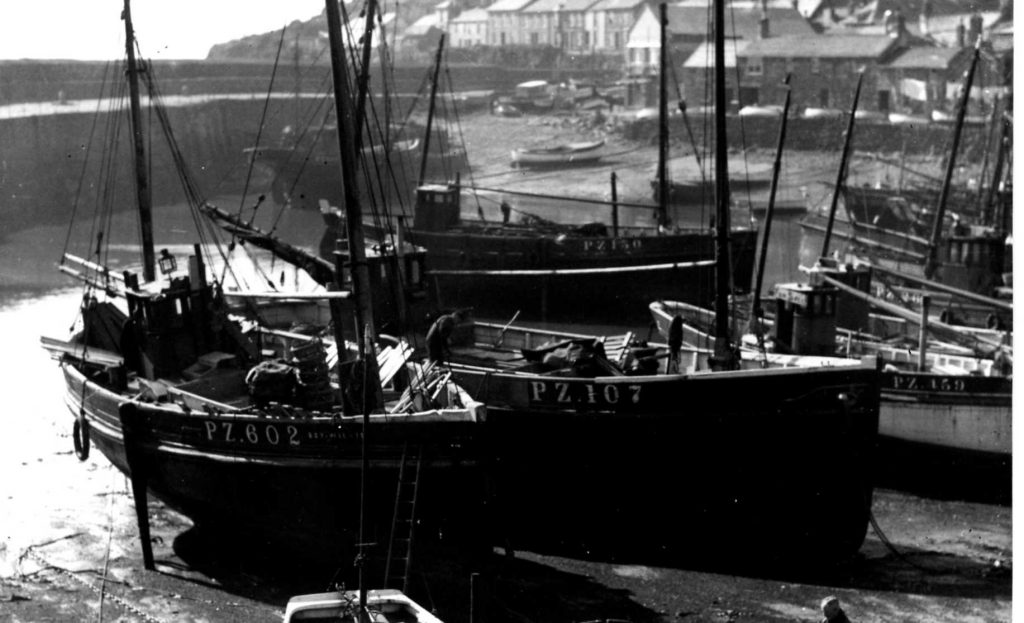
Three of the last generation of Mousehole luggers still fishing in the 1930s. [Source: Richards Bros., Penzance]
In the mid nineteen-thirties, poor fishing results, and a growing tendency for local fishermen to persuade their sons to seek more remunerative and less hazardous occupations, led to scarcity of local fishermen to man the boats. A very full column on the crisis was published in the Cornishman of February 21st, 1935 – too long to be included here, but a few abstracts are pertinent:
Last year about fourteen boats went to Plymouth, and returned home in dire distress. Many homes were faced with stark poverty, and proud fishermen, who all their life had looked the whole world in the face, had to seek the charity of the Public Assistance Committee.
This year the boats were fitted out and went to Plymouth, but several of the crews were made up by men nearing a pensionable age. The long-lining fishing is much harder, however, and old men who had been engaged during the herring season expressed their unwillingness to take part in the long-liners. The lines carry from 1,500 to 2,500 hooks, which have to be baited, and on a single trip the likes are frequently “shot” three times. This hard life obviously is too hard for old men.
This winter four Mousehole boats – the Renovelle, Inter Nos, Ben Machhee, and Boy Willie – went to Dunmore (Ireland). They fished within three or four miles of the harbour, in sheltered waters, but after four or five weeks’ trials, the highest catch did not exceed seven crans. These were landed at Dunmore, and sold for 30s. a cran. Had they taken their catches to Milford Haven they would have received £3 and upwards per cran. The Renovelle did this on her last trial.
But the question still looms large: Whither Cornish fishing?
Cornishman, Thursday, February 21st, 1935
It was not quite on its last legs, but the nature of the western fisheries was changing. Usually the Mount’s Bay boats that ventured in the North Sea herring fishery, made Whitby and Scarborough their seasonal headquarters, returning home at the end of September. They rarely stopped at either of the East Anglian ports for the latter part of the fishery, but in 1936 a few boats broke with tradition.
CORNISH DRIFTERS LEAVE: For the first time in connection with the East Anglian herring season, three Cornish first-class motor boats are to take part during the next few weeks.
Mousehole Lyonesse and Renovelle, and Newlyn Madeline left their respective Mount’s Bay ports yesterday to take up headquarters at Lowestoft, and will be worked partly by local and East Coast fishermen.
Western Morning News, Tuesday, October 13th, 1936
No report on their success or otherwise has been found, and early in 1937, the crew of the Renovelle again tried their luck in Irish waters.
GOING TO IRELAND – Mount’s Bay Drifters Leave Home Waters.
In consequence of a bad herring season in Mount’s Bay and Bigbury Bay, and following several weeks’ stormy weather, the first-class drifters Renovelle and Internos left Mousehole yesterday for Dunmore, Ireland.
A few small drifters made trials last night in Mount’s Bay.
Western Morning News, Friday, January 15th, 1937
Yet again we don’t know how they fared on that voyage, probably nothing worth shouting about, but twelve months later the Renovelle plied the same waters with a modicum of success.
CORNISH FISHERY – Heavy Seas Hamper Herring Drifters.
Mousehole, Newlyn, Porthleven, and St. Ives motor herring drifters, making Newlyn their rendezvous, have been hampered by strong westerly winds and heavy seas since last Thursday night, and a few crews of the smaller units have temporarily relinquished that branch of fishing, and stored their gear for another season.
Majority of the first-class boats took advantage of a lull last evening and left [Plymouth] for Mount’s Bay waters. They intend working on local grounds throughout the present month.
The Penzance Renovelle, the only Cornish representative operating in the Irish Sea, made two landings in Dunmore up to the past week-end. Prices averaged 30s per cran, and values exceeded £100.
Western Morning News, Wednesday, January 12th, 1938
That autumn saw the Renovelle up in the North Sea again, fishing for herring out of Lowestoft.
CORNISH CREW’S LUCK – Amazing Haul Of Herring Off East Coast.
Fishing off East Anglia, the Mousehole Renovelle’s gear was struck by a shoal of herring while operation out of Lowestoft last week.
With great difficulty the crew secured half the nest safely inboard with meshing estimated at seventy-five crans, the craft then being practically laden to the gunwale, and unable to proceed with the hauling of the remaining dozen nets.
A flare called a near-by drifter, which took over the gear from the Renovelle. It was mainly recovered intact, with a further estimated quantity of 70,000 herrings.
Although prizes ruled low, Cornish crews had values from £100 downwards, as results of first trials off the East Coast.
Western Morning News, Tuesday, November 1st, 1938
The Penzance weekly paper also covered the story – from copy presumably submitted by the same reporter:
MOUSEHOLE FISHING BOAT’S LUCK – STRIKES HUGE SHOAL OF HERRING
While fishing off Lowestoft last week, the Mousehole fishing boat Renovelle struck a huge shoal of herring. With great difficulty the crew secured half the nets safely inboards with meshing estimated at seventy-five crans, the craft being then practically laden to the gunwale, and unable to proceed with the hauling of the remaining dozen nets.
A flare called a near-by drifter, which took over the gear from the Renovelle. It was mainly recovered intact, with a further estimated quantity of 70,000 herring.
Although prices ruled low, Cornish crews had values from £100 downwards, as results of first trials off the East Coast.
Cornishman, Thursday, November 3rd, 1938
In neither account were the names of any of the other Cornish boats mentioned.
Early in 1939 the boat was in Irish waters when the Renovelle happened to be in the right place at the right time.
PENZANCE MAN SAVES DRIFTING VESSEL.
Mr. E. F. Madron, of Mousehole, Master of the Penzance motor-drifter Renovelle, was the hero of a thrilling rescue when fishing off the Waterford coast last week.
Responding to distress signals, he came up with another motor fishing vessel, the Flying Sprays, of Waterford, Ireland, which had been drifting for over twelve hours owing to an engine breakdown.
The crew of four, who had burnt all their blankets to make flares, were almost exhausted from exposure when the Renovelle arrived.
EXPERT SEAMANSHIP.
Despite a strong northerly wind and high seas, Mr. Madron succeeded in getting a line on board the Flying Sprays and towing her into Dunmore East, a small harbour at the mouth of the River Suir.
The rescued crew gave high praise to the expert seamanship of Mr. Madron and his crew, and expressed the view that if the Renovelle had not reached them when she did they would have been lost.
Mr. Madron is second coxswain of Penzance lifeboat.
Western Morning News, Friday, February 3rd, 1939
The Renovelle then dropped out of the news, and when in September 1939, World War Two broke out, and the whole fishing scene was turned on its head. Like most of the bigger local motor fishing boats the Renovelle was requisitioned on HM Service during 1940-42, but for some reason was restored to her owners in 1943. That year her certificate as a working fishing boat was endorsed on November 17th – and she was immediately in the news once more.
BABY TUNNY – CAUGHT BY MOUSEHOLE FISHING BOAT.
Here is a story that will interest all fishermen.
Whilst fishing in Mount’s Bay on Friday night the Mousehole fishing boat Renovelle, owned by Mr. Eddy Madron, landed a baby tunny. It had been caught in a net.
It is believes that this is the first time that a baby tunny has been caught in these waters.
The only large tunny landed locally washed up on the beach at Porthleven a few years ago, and was later sold on the Newlyn market. In those days many tunny fish were sighted in Mount’s Bay and farther out, and fishermen came from all parts of England in the hopes of landing some. They were never successful. Had they been there was talk of setting up a tunny fish industry at Newlyn.
Cornishman, Thursday, November 18th, 1943
In February 1948, Mr. E. F. Madron (Renovelle), was one of four representatives sent to Scotland to learn the technique of ring-netting – the others being; Mr. F. S. H. Richards (Janie); Mr. W. S. Capper (Renovate); & Mr. J. J. Pender (Lyonnesse). But it did not prove successful in the pilchard fishery. The pilchards being too nimble, and the local boats not powerful enough to enclose the shoals before they escaped. It was many several generations of boats, fishermen and equipment before ring-netting, or purse-seining, became a viable method of catching pilchards.
In May 1949, Edwin Francis Madron joined his father, as part owner of the boat, as did James Bassett. About the same time the Renovelle was also placed on the ‘shipping’ register when she was given the Official Number 164795 – possible because of a mortgage, but I have not checked this.
Back in Plymouth that winter for the herring season when the boat rescued a man from drowning, though the report of the rescue was rather sketchy:
Hearing cries for help at the Barbican, Plymouth, yesterday, Skipper Eddie Madron, of the fishing boat Renovelle. Sailed his craft to the scene and saved a man from drowning.
The man was taken to the South Devon and East Cornwall Hospital, Freedom Fields, and later discharged.
It is understood that the man fell overboard from a ship which had been discharging cargo at Duke’s Dock, Plymouth.
Western Morning News, Tuesday, December 21st, 1949
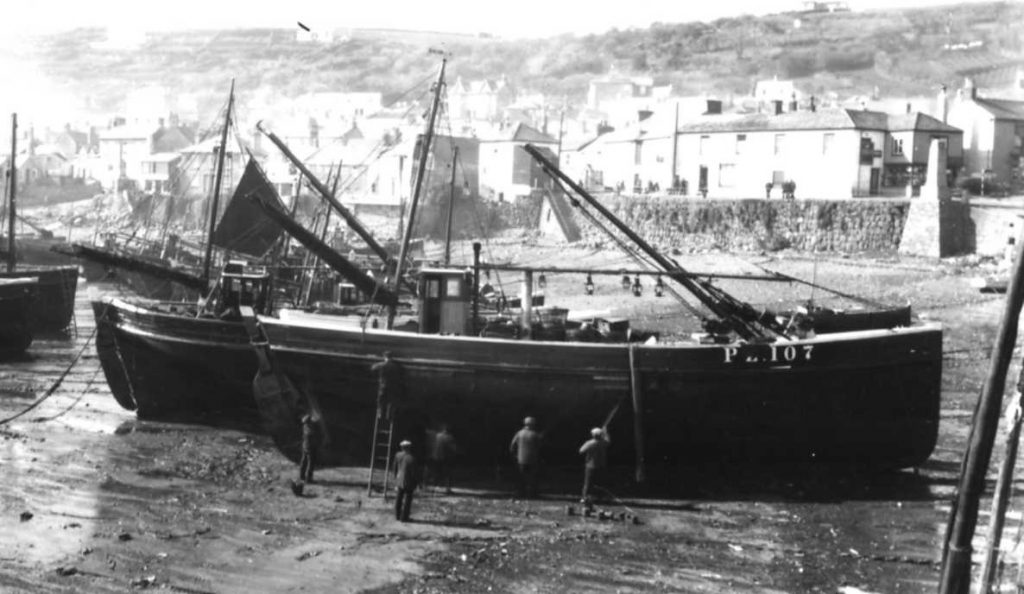
During this post war period, towards the end of her working life, the Renovelle was photographed aground in Mousehole harbour, having her bottom scrubbed clean
A few years later and she was deemed no longer fit for service, and her registration was cancelled on October 5 1954, when her register entry was endorsed to the effect that she was ‘no longer used for fishing’.
I’m not sure whether she was then broken up, or sold. But it seems to me that she was broken up, and a final photograph of her shows her hauled up as high as possible under the Cliff at Mousehole with here decks cleared of gear, awaiting her final fate.
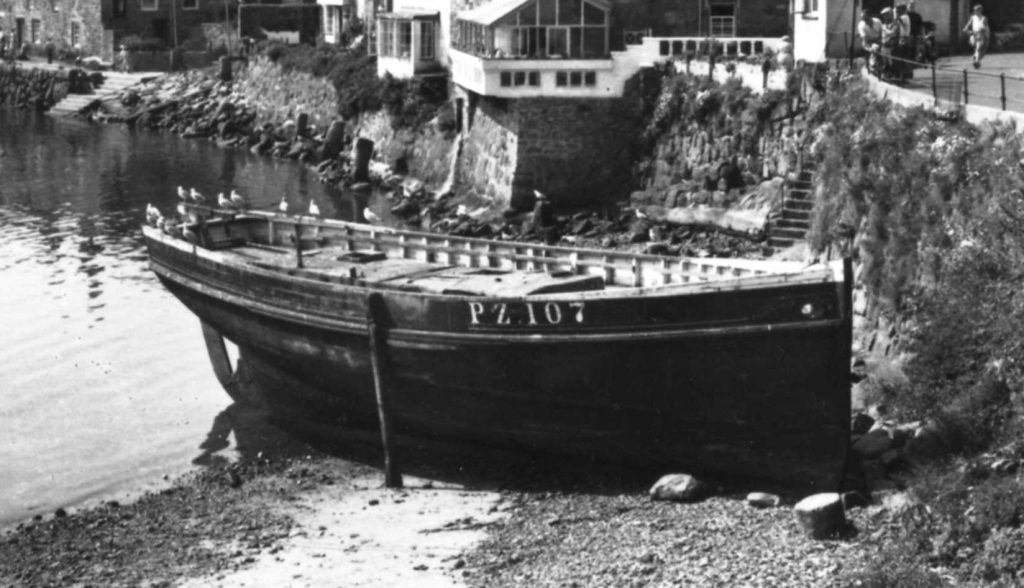
The more I think about it, the more I’m sure that she was broken up there, as I seem to remember a yarn about an old fellow stripping the planking off her hull. Prising the ends of each strake away from the stem, he walked backwards on the beach wrenching them away from their fastenings, frame by frame. Several young lads stood on the beach watching him, and one of them foolishly said ‘That look easy.’ ‘Have a go,’ says the old fellow, allowing the boy to grab the end of the plank he was currently stripping. Once the boy had a good grip, he let go, and the lad found himself catapulted into the stem, narrowly escaping lacerated hands and receiving a bruised forehead. ‘Easy enough?’
In 1955 a new Renovelle, was acquired by the Madron’s. She was given the fishing number PZ. 523, but her history is yet another story.
Tony Pawlyn
29 April 2020
